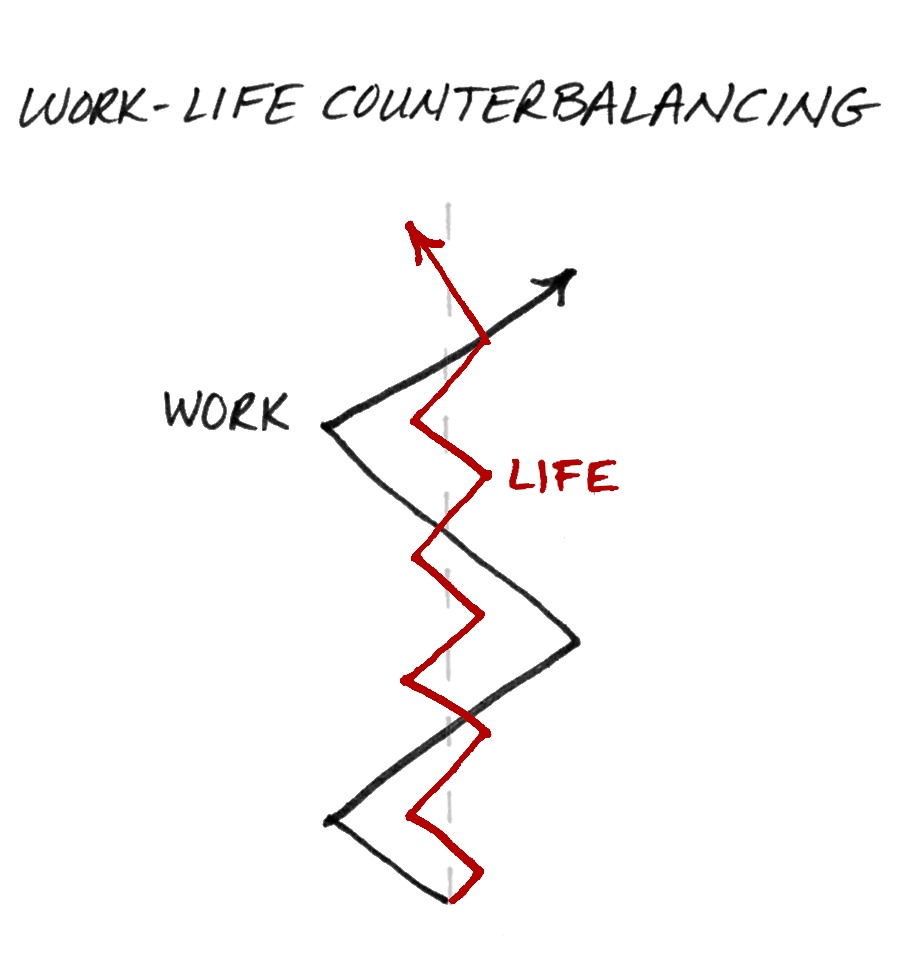
“Seen as something we ultimately attain, balance is actually something we constantly do. A ‘balanced life’ is a myth — a misleading concept most accept as a worthy and attainable goal without ever stopping to truly consider it.”
— Gary Keller & Jay Papasan, The ONE Thing
Work-life balance is a seductive idea, and presents itself in many disguises. It’s the idea that at some point in the future, the stars will align and you will be able to prioritize your time, energy and attention between your work and your personal life in perfect proportion.
That’s a big request. Sometimes your work-life ramps up into overdrive and you have no choice but to focus exclusively on getting it done. Other times, your family will need you more than usual, or your health will start making its demands known, or you’ll face a spiritual crossroads.
Sometimes those things happen at the same time, and to think that we can maintain a ‘work-life balance’ is, unfortunately, bunk. It’s a destructive form of wishful thinking that stops us from being present and focused in each moment.
You’ve probably heard it said before: you can have anything you want, but not everything you want.
When we want to live extraordinary lives, at some point we are all forced to make a choice: where to invest our precious time and energy. Most of us can give our deep attention to two or three areas of our lives — at most — if we are going to do something truly remarkable.
Whether it’s building a successful business, raising a family that will do real good in the world, or becoming world-class at a musical instrument, physical activity or language, we can’t do it if we take the ‘balanced’ approach. We have to be all in. Like Gary Keller and Jay Papasan say in their bestseller The ONE Thing,
“The reason we shouldn’t pursue balance is that magic never happens in the middle; magic happens at the extremes.”
But there’s a catch.
“The dilemma is that chasing the extremes presents real challenges. We naturally understand that success lies at the outer edges, but we don’t know how to manage our lives while we’re out there.”
When we focus deeply on one area, most other parts of our lives will be at a stand-still, ‘hibernating’ until we’re ready to come back to them. But we have to understand that too long spent at the extremes can start actively damaging some areas — particularly when other people are involved.
For example, if you spend six months working 80-hour weeks, your business might become the huge success you dream of, but your health is going to take a beating. Your sleep will suffer, you’ll be less fit than you’d like, and your diet will probably be sub-par. Once you’re done with that slog, though, you’ll be able to focus on your health again and build it back up to a good level fairly quickly.
Health is an area that often bounces back quickly… but marriages tend to do the opposite.
Long stretches of neglect can do irreparable damage to a relationship, and trying to make up for lost time often won’t cut it. It’s the same with our relationships with our kids, our friends, and our mentors, so remember:
“When you gamble with your time, you may be placing a bet you can’t cover. Even if you’re sure you can win, be careful that you can live with what you lose.”
When we are motivated to create magic, out at the extremes, the way to protect the downside is not by chasing after work-life balance, but by leveraging counter-balance.
Counter-balance is the process of focusing exclusively on the important task at hand, whether it’s work, teaching our kids something or working out. We have to choose what’s critical and give it as much time as it needs before switching to the next most important thing.

As you can see from the image, it works best to give extreme attention to work at less frequent intervals, while giving our personal lives more frequent attention, even if it’s a little less intense.
(A few weeks of relentless focus on a single project at work might produce a surge in results; a few weeks of relentless focus on teaching something to your kids might produce a meltdown!)
Don’t leave anything in your personal life in the lurch for long, but learn to accept it as the norm in your work life. You will never get everything done at work, and the sooner you understand that, the sooner you can focus on the tasks that will have the biggest impact.
Whatever you’re doing, though, be fully present. This is the secret of counter-balance: bringing our full attention to the effort at hand.
Work like a machine when you’re in a work cycle, and give your whole and undivided attention to the activities and people you’re engaging with when you’re in a personal cycle. Don’t try to create an overlap and handle both parts of your life at once. Counter-balance instead, and get better results everywhere.
And if you’re having trouble with the counter-balance concept, you’re not alone. Get the Long-Term Goals Worksheet here to map out what truly matters to you, to help give you a clear sense of where to focus your attention in your personal life and in your work life.

